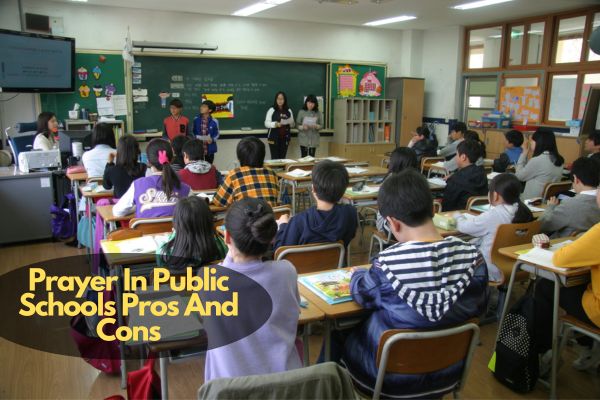Table of Contents Show
Public schools have long been a battleground for debates surrounding religious expression and freedom. The topic of prayer in public schools continues to ignite passionate discussions among educators, parents, and policymakers. While some advocate for the allowance of prayer in schools, others argue that it blurs the lines between church and state. This article looks into the nuanced pros and cons of permitting prayer in public schools, exploring the impact on students, communities, and the education system.
Prayer In Public Schools Pros And Cons
The debate over prayer in public schools involves the discussion of its potential benefits, such as fostering a sense of morality and spiritual growth, alongside the concerns regarding religious neutrality and inclusivity. Understanding the various perspectives is crucial in navigating this complex issue within the educational landscape.
Pros of Prayer in Public Schools
Moral Development and Values
One of the primary arguments supporting prayer in public schools revolves around its potential to foster moral development and inculcate essential values among students. Advocates emphasize the role of prayer in promoting empathy, compassion, and a sense of responsibility towards others.
Encouraging Spiritual Growth
Proponents of prayer argue that its inclusion in school activities can contribute to the spiritual growth of students, providing them with a sense of purpose and a moral compass to navigate life’s challenges. Prayer, in this context, is seen as a tool for nurturing inner peace and fostering a sense of connection with a higher power.
Creating a Sense of Community
Prayer sessions in schools are often seen as a unifying force that brings together students from diverse backgrounds, fostering a sense of community and shared values. Proponents suggest that communal prayer can promote a collective sense of belonging and solidarity, contributing to a positive school environment.
Cons of Prayer in Public Schools
Infringement of Religious Freedom
One of the significant concerns raised by critics of prayer in public schools is the potential violation of the principle of religious freedom. They argue that mandatory or even voluntary prayer sessions can impose religious beliefs on students who do not share the same faith or belief system, leading to feelings of exclusion and discomfort.
Potential Exclusion of Certain Groups
Critics also point out that the presence of prayer in public schools can marginalize students from minority religious groups or those with non-religious affiliations. The emphasis on a specific prayer tradition may create a sense of alienation and otherness, hindering the establishment of an inclusive and welcoming educational environment.
Controversy and Conflict
The introduction of prayer in public schools often sparks controversy and conflicts within the school community, pitting individuals with differing beliefs against one another. Such disputes can lead to tensions and divisions, impacting the overall school climate and potentially affecting students’ well-being and academic performance.
Legal Considerations
The inclusion of prayer in public schools raises significant legal considerations, primarily revolving around the Establishment Clause of the First Amendment. The U.K. legal framework, like that of the U.S., emphasizes the separation of church and state, prohibiting the endorsement of any specific religious practice within public educational institutions. Various Supreme Court cases and precedents have shaped the interpretation and application of these legal principles, establishing clear boundaries for religious activities within the school context.
Alternatives to Prayer in Public Schools
Acknowledging the diverse religious and non-religious perspectives within the school community, many educators and policymakers have explored alternative practices that promote ethical and spiritual development without promoting any particular religious doctrine. Practices such as meditation and mindfulness have gained popularity, offering students a means to cultivate inner reflection and emotional well-being without aligning with a specific religious tradition. Additionally, secular ethics education programs have been developed to instill moral values and critical thinking skills while respecting the diverse cultural and religious backgrounds of students.
Public Opinion and Current Trends
Surveys and polls on the subject of prayer in public schools have indicated fluctuating public opinions over time. While some segments of society continue to support the inclusion of prayer as a means to reinforce moral values, others advocate for a secular educational environment that respects the diverse religious beliefs and backgrounds of students. Current trends reflect a growing emphasis on inclusivity and the recognition of the multifaceted nature of spirituality and moral development.
Case Studies and Examples
Examining case studies from different regions provides insights into both the successful implementation and the challenges associated with prayer in public schools. Instances of successful integration often highlight the importance of fostering a culture of respect and understanding, where students from various religious and non-religious backgrounds can coexist harmoniously. On the other hand, challenges and drawbacks observed in certain cases emphasize the need for careful consideration of the implications of endorsing specific religious practices within the public school system.
Analysis of Academic Performance
Several studies have explored the potential correlation between prayer in public schools and students’ academic outcomes. While some research suggests a positive association between spiritual practices and academic success, others emphasize the importance of a secular educational environment that prioritizes critical thinking, scientific inquiry, and the development of cognitive skills. Understanding the nuanced relationship between spirituality and academic performance is essential in shaping effective educational policies and practices.
International Perspectives
Comparing the practices of prayer in public schools across different countries provides a broader perspective on the cultural, legal, and social considerations associated with this issue. While some countries have adopted a more inclusive approach, accommodating various religious traditions within the public education system, others have opted for a strictly secular framework that emphasizes the neutrality of the state in matters of religion. Understanding these diverse international perspectives can inform the development of comprehensive policies that balance the values of religious freedom and inclusivity within the educational context.
Ethical and Moral Arguments
Exploring the ethical implications of prayer in public schools involves a nuanced analysis of the intersection between religious freedom, individual autonomy, and the collective well-being of the school community. Ethical debates often revolve around the principles of respect, tolerance, and the promotion of a pluralistic society that values diversity and mutual understanding. Considering the ethical dimensions of prayer in public schools is crucial in fostering a school environment that upholds the principles of equality and inclusivity for all students.
Impact on Mental Health
The psychological impact of prayer in public schools is a subject of significant interest, with researchers examining its influence on students’ mental health and emotional well-being. While proponents highlight the potential benefits of prayer in promoting resilience and emotional stability, critics raise concerns about the potential stress and anxiety that students from non-aligned religious backgrounds may experience. A comprehensive understanding of the psychological implications of prayer in public schools is essential in creating a supportive and nurturing educational environment that prioritizes the holistic well-being of all students.
Role of Secularism in Education
The principle of secularism plays a vital role in shaping the educational landscape, emphasizing the neutrality of the state in matters of religion and the protection of individual freedoms. By upholding the principles of secularism, public schools can create an inclusive and respectful environment that respects the diverse religious and non-religious beliefs of students and educators. Balancing the values of secularism with the recognition of the importance of spirituality and moral development is key in establishing a comprehensive framework for educational practices and policies.
Stakeholder Perspectives
Understanding the diverse perspectives of stakeholders, including educators, parents, and students, is essential in shaping effective and inclusive educational policies. Educators may emphasize the importance of promoting critical thinking and respect for diverse beliefs, advocating for educational practices that foster a culture of inclusivity and mutual understanding. Parents may express concerns about the potential imposition of religious beliefs on their children, highlighting the importance of creating a supportive and non-discriminatory educational environment. Students may offer insights into their personal experiences and perspectives, emphasizing the significance of respect and empathy in promoting a positive school climate that values diversity and individual autonomy.
Proposed Solutions and Compromises
In light of the complex and multifaceted nature of the debate surrounding prayer in public schools, various proposed solutions and compromises have been put forward to address the concerns of different stakeholders. Balancing the values of religious freedom and inclusivity requires the development of comprehensive policies that respect the diverse religious and non-religious beliefs of students while upholding the principles of secularism and equality. Encouraging dialogue and fostering a culture of respect and understanding can pave the way for effective compromises that prioritize the well-being and educational development of all students.
Conclusion
The debate on prayer in public schools underscores the need for a comprehensive and inclusive approach that respects the diverse religious and non-religious beliefs of students while upholding the principles of secularism and equality.
Balancing the values of spirituality and moral development with the promotion of an inclusive and respectful educational environment requires careful consideration of the legal, ethical, and psychological dimensions of this issue. By fostering dialogue, promoting empathy, and advocating for the values of mutual understanding and respect, public schools can create an environment that nurtures the holistic development and well-being of all students, irrespective of their religious or non-religious affiliations.






